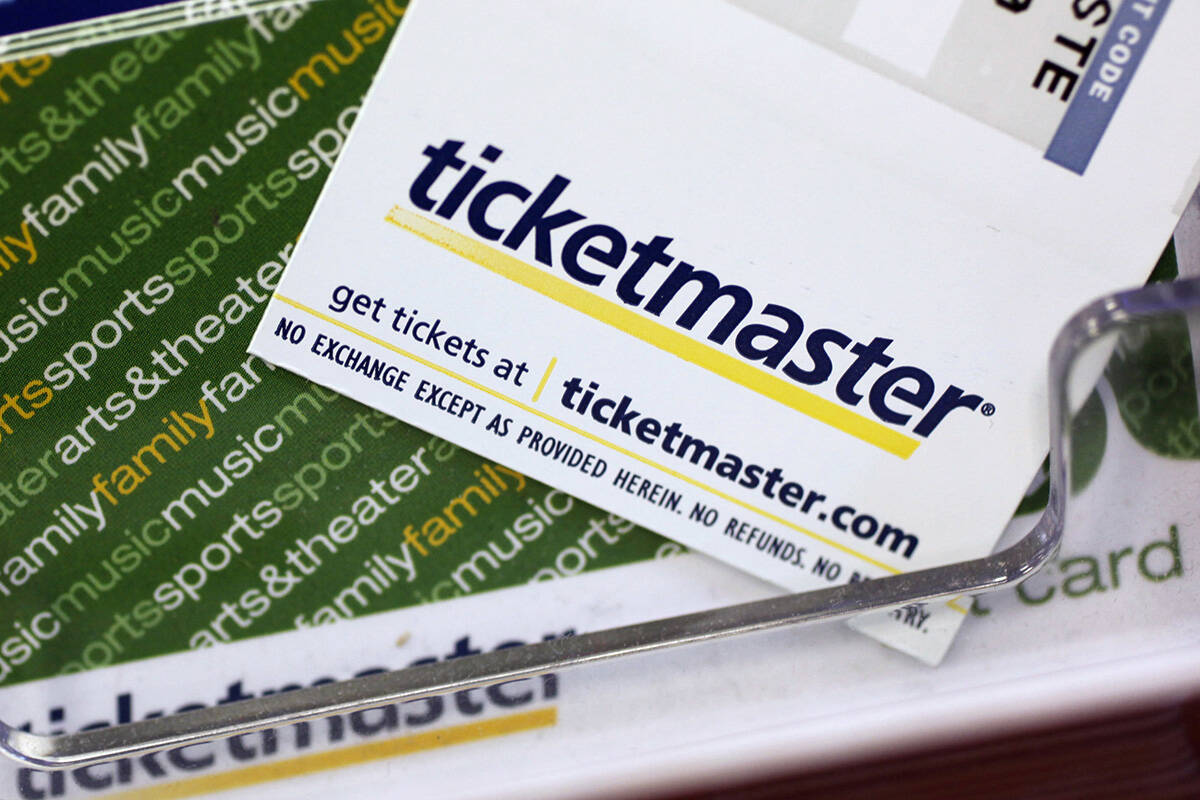Ticketmaster and Live Nation an illegal monopoly, Justice Department lawsuit says
WASHINGTON — The Justice Department filed a sweeping antitrust lawsuit against Ticketmaster and parent company Live Nation Entertainment on Thursday, accusing them of running an illegal monopoly over live events in America — squelching competition and driving up prices for fans.
The lawsuit, filed in federal court in Manhattan, was being brought with 30 state and district attorneys general, including Nevada’s, and seeks to break up the monopoly they say is squeezing out smaller promoters and hurting artists.
“We allege that Live Nation relies on unlawful, anticompetitive conduct to exercise its monopolistic control over the live events industry in the United States at the cost of fans, artists, smaller promoters, and venue operators,” Attorney General Merrick Garland said in a statement. “The result is that fans pay more in fees, artists have fewer opportunities to play concerts, smaller promoters get squeezed out, and venues have fewer real choices for ticketing services. It is time to break up Live Nation-Ticketmaster.”
The Justice Department accuses Live Nation of a slew of practices that allow it to maintain a stronghold over the live music scene, including using long-term contracts to keep venues from choosing rival ticketers, blocking venues from using multiple ticket sellers and threatening venues that they could lose money and fans if they don’t choose Ticketmaster. The Justice Department says Live Nation also threatened to retaliate against one firm if it didn’t stop a subsidiary from competing for artist promotion contracts.
“Nevada, with our reliance on the tourism sector and live entertainment, feels the effects of increasing prices in this area deeply,” Nevada Attorney General Aaron Ford said in a statement. By joining this lawsuit, we will fight to keep our world-class experiences more affordable for both Nevadans and tourists.”
Live Nation has denied that it engages in practices that violate antitrust laws. In a statement Thursday, the company said that the lawsuit “won’t solve the issues fans care about relating to ticket prices, service fees, and access to in-demand shows. Calling Ticketmaster a monopoly may be a PR win for the DOJ in the short term, but it will lose in court because it ignores the basic economics of live entertainment, such as the fact that the bulk of service fees go to venues, and that competition has steadily eroded Ticketmaster’s market share and profit margin.”
The company also said it will “defend against these baseless allegations, use this opportunity to shed light on the industry, and continue to push for reforms that truly protect consumers and artists.”
Live Nation is the top booking company in Las Vegas, with exclusive partnerships at Bakkt Theater at Planet Hollywood, the Colosseum at Caesars Palace and BleauLive Theater at Fontainebleau. It also owns two venues in Las Vegas: House of Blues at Mandalay Bay and Brooklyn Bowl at Linq Promenade.
When it was reported that the company was under federal investigation in 2022, the concert promoter said in a statement that Ticketmaster enjoys a such a large share of the market because of “the large gap that exists between the quality of the Ticketmaster system and the next best primary ticketing system.”
But competitor ticket sellers have long complained that Live Nation makes it difficult for them to disrupt the market with practices such as withholding acts if those venues don’t agree to use Ticketmaster’s service.
The lawsuit is the latest example of the Biden administration’s aggressive antitrust enforcement approach targeting companies accused of engaging in illegal monopolies that box out competitors and drive up prices. In March, the Justice Department filed a lawsuit against Apple alleging that the tech giant has monopoly power in the smartphone market. The Democratic administration has also taken on Google, Amazon and other tech giants.
“Today’s action is a step forward in making this era of live music more accessible for the fans, the artists, and the industry that supports them,” Deputy Attorney General Lisa Monaco said in a statement.
Ticketmaster, which merged with Live Nation in 2010, is the world’s largest ticket seller, processing 500 million tickets each year in more than 30 countries. Around 70% of tickets for major concert venues in the U.S. are sold through Ticketmaster, according to data in a federal lawsuit filed by consumers in 2022. The company owns or controls more than 265 of North America’s concert venues and dozens of top amphitheaters, according to the Justice Department.
The ticket seller sparked outrage in November 2022 when its site crashed during a presale event for a Taylor Swift stadium tour. The company said its site was overwhelmed by both fans and attacks from bots, which were posing as consumers to scoop up tickets and sell them on secondary sites. The debacle prompted congressional hearings and bills in state legislatures aimed at better protecting consumers.
The Justice Department allowed Live Nation and Ticketmaster to merge as long as Live Nation agreed not to retaliate against concert venues for using other ticket companies for 10 years. In 2019, the department investigated and found that Live Nation had “repeatedly” violated that agreement and extended the prohibition on retaliating against concert venues to 2025.
Review-Journal columnist John Katsilometes contributed to this report.






















